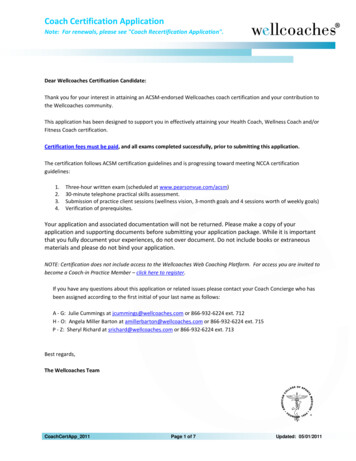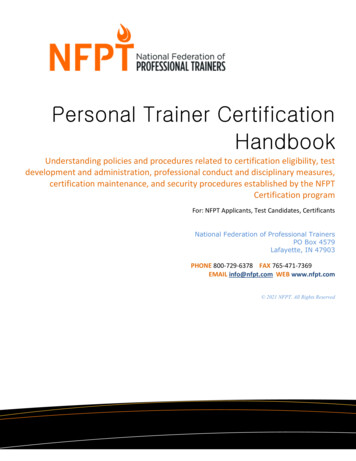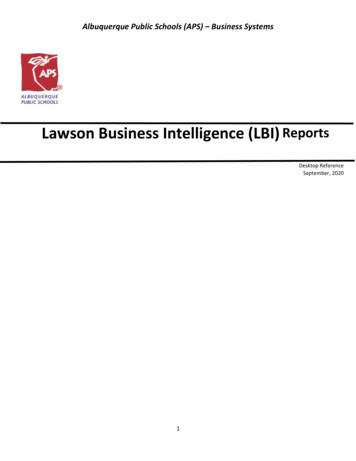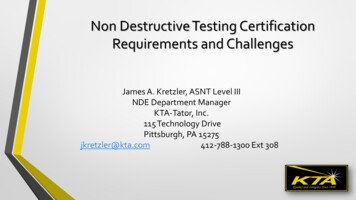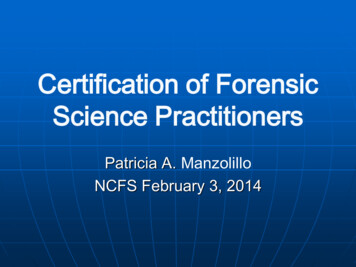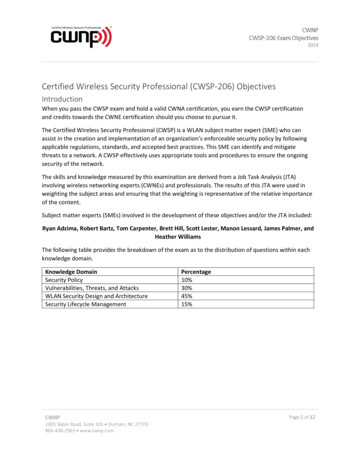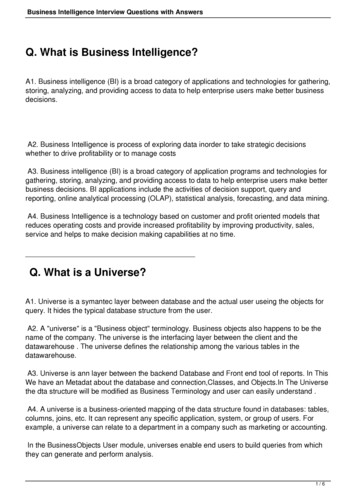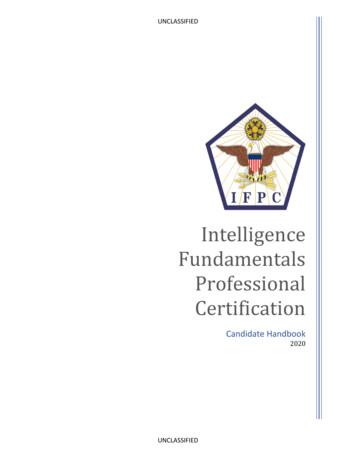
Transcription
rtificationCandidate Handbook2020UNCLASSIFIED
UNCLASSIFIEDThe Intelligence Fundamentals Professional Certification (IFPC) Program is sponsored by theDepartment of Defense (DoD), Office of the Under Secretary of Defense for Intelligence andSecurity (OUSD(I&S)). The IFPC Program is governed by the IFPC Governance Council(CCITP GC). The IFPC Program Management Office (IFPC PMO) executes all IFPCprogrammatic functions on behalf of the IFPC GC. Questions or concerns regarding thishandbook or the IFPC Program can be directed to the IFPC PMO: OSD.IFPC@mail.mil(NIPRnet). To obtain more information about the IFPC Program or to download a copy of thishandbook, please visit https://dodcertpmo.defense.gov/IFPC.Version 1.1UNCLASSIFIED
UNCLASSIFIEDChangeUpdate name of OUSD(I&S) to reflect recent change; change made throughoutdocument.Clarified that Certificants will receive a printable PDF certificate in addition todigital badgeUpdated PMO email address to reflect an easier email aliasUpdates to the Essential Body of Knowledge to some newly updated policies, ordead linksUNCLASSIFIEDVersion1.11.11.11.1
UNCLASSIFIEDTable of ContentsProgram Overview . 1Introduction . 1IFPC Program Purpose . 1Benefits . 1Eligible Population . 2Non-Discrimination Policy. 2Registering for and Scheduling the IFPC Assessment . 3Requests for Reasonable Accommodations . 3Preparing for the IFPC Assessment . 4Taking the IFPC Assessment. 5Testing Environment . 5Assessment Security and Confidentiality . 6Terms and Conditions . 6Non-Disclosure Agreement . 6After the IFPC Assessment . 7Results . 7Feedback . 7Retesting . 7IFPC Conferral . 7Use of IFPC Program Credentials . 8Certification Maintenance/Recertification . 9Reinstatement of Expired Credentials . 10Appeals Policy . 10Grounds for Appeal . 10Decisions Not Eligible for Appeal . 10Appeals Process . 10Appeals Review . 10Waiver Policy . 11Waivers Process and Procedures . 11Waiver Request Submission, Decision, and Notification . 12IFPC Program Background . 12Governance . 12Assessment Development . 12Determining Passing Score . 13Appendix A: Essential Body of Knowledge . 15Appendix B: Appeal Request Form . 18Appendix C: Waiver Request Form . 19UNCLASSIFIED
Program OverviewIntroductionThe Department of Defense (DoD) Intelligence Fundamentals Professional Certification (IFPC)Candidate Handbook provides candidates and other interested parties with information onprogram intent, eligibility requirements, steps to take the certification assessment, andprogram policies and procedures.IFPC Program PurposeThe IFPC program is sponsored by the Under Secretary of Defense for Intelligence and Security(USD(I&S)) to professionalize the defense intelligence workforce by establishing a commonstandard of the fundamental knowledge and skills expected of all who serve and support, andthose who hope to serve and support, in the Defense Intelligence Enterprise (DIE). The IFPC isbased on the Defense Intelligence Fundamentals standards, which are cross-cutting andenterprise-wide, and depict the Department’s core expectations of what all DefenseIntelligence Professionals, regardless of Service/Agency, Function/Specialty and experiencelevel, must know and/or be able to do to successfully execute and/or contribute to theexecution of intelligence missions, functions, and activities at the fundamental level. The IFPCwill also serve to ensure incoming defense intelligence professionals meet knowledgestandards.The IFPC assessment measures acceptable performance across eight knowledge domains:1. What is intelligence?2. What are the intelligence disciplines?3. Who is involved in intelligence?4. Why does intelligence require oversight?5. How is intelligence conducted?6. How are classified and controlled materials protected?7. How are classified and controlled materials shared?8. How do my actions affect my status as an intelligence professional?BenefitsBenefits of obtaining the IFPC credential include:For individuals: Measures your understanding and ability to apply the facts, concepts, and principles ofdefense intelligence deemed critical to working within the DIE. Promotes professional development which will enhance your expertise in the defenseintelligence field. Increases the number of employment opportunities available to you across the DIE. Provides you with a sense of pride and professional accomplishment. Demonstrates your commitment to the defense intelligence profession.IFPC Candidate HandbookUNCLASSIFIED1
UNCLASSIFIEDFor employers: Provides a reference point for determining which individuals possess the appropriateunderstanding and ability to apply the facts, concepts, and principles of defenseintelligence deemed critical to the successful execution of intelligence missions andfunctions. Promotes the improved synchronization and alignment of individual capabilities withspecific organizations across the DoD. Serves as an easy identifier for competent professionals within the defense intelligencediscipline.For the profession: Defines standards and drives accountability for all defense intelligence professionals. Documents the Intelligence Fundamentals essential body of knowledge (EBK) as theprofessional standard. Ensures all defense intelligence professionals have met the established standardthrough a formal standardized evaluation. Supports continuing competence of certificants through recertification every threeyears.Eligible PopulationThe IFPC is available to individuals who 1) hold U.S. Citizenship and, 2) meet all therequirements of at least one of the following eligibility categories: Category 1: Government. An individual must be a Military or Civilian person currentlyemployed by the DoD (waivers can be provided to personnel currently employed by afederal, state, tribal, or local government entity supporting DoD-recognized intelligencemissions; please see Waiver Policy for details). Category 2: Academia. An individual must be enrolled and/or employed in the last sixmonths at a U.S.-based, regionally accredited, post-secondary academic institution witha formal relationship with the DoD (i.e., institutions participating in the DoD VoluntaryEducation MoU program). Category 3: Industry. An individual must be employed by an organization eligible topursue contracts with the U.S. Intelligence Community (i.e., organizations that hold aCAGE code). Note: This includes individuals currently working on contract with aComponent of the DIE.The IFPC Eligibility Policy was approved by the Intelligence Fundamentals ProfessionalCertification Governance Council (CGC) on 23 May 2017.Non-Discrimination PolicyThe IFPC Program does not discriminate on the basis of race, color, national origin, sex(including pregnancy or childbirth), religion, age (40 or over), disability (physical or mental),sexual orientation, marital status, parental status, political affiliation, genetic information, orretaliate for participating in protected activities. The IFPC Program complies with all applicablejurisdictional laws and regulations related to protection against discrimination in access to IFPCexams. Additionally, IFPC procedures ensure that all applicants and candidates are treated in anIFPC Candidate HandbookUNCLASSIFIED2
UNCLASSIFIEDequitable and consistent manner throughout the entire certification process. The eligibilityrequirements, assessment instrument content, assessment environment, scoring method, andmaintenance and recertification process provide for a fair, impartial, and bias-free certificationprogram.Registering for and Scheduling the IFPC AssessmentIndividuals interested in taking the IFPC assessment must first register for the program, thenselect and book a specific testing session. IFPC assessment registration is completed online in. Individuals will be required to complete aseries of demographic questions and review the IFPC Terms and Conditions prior to taking theassessment.Before scheduling your assessment, you must have already: Submitted your assessment application for /)Requests for Reasonable AccommodationsIf requested, the CPMO will work with assessment centers to provide reasonableaccommodations in compliance with the Americans with Disabilities Act (ADA), theRehabilitation Act, and DoD policy.In general, an accommodation is made when a disability is relieved by an auxiliary aid or aprocedural change during assessment administration. Reasonable accommodations will bemade for known physical or mental limitations if the candidate is a qualified individual with adisability.A request for a reasonable accommodation is a written statement from a candidate requestingan adjustment or change for a reason related to a disability. A request does not have to use anyspecific words, such as “reasonable accommodation,” “disability,” or “Rehabilitation Act.” If acandidate has a disability, he/she may request a reasonable accommodation, even if thecandidate has not previously disclosed the existence of a disability.It is the responsibility of the candidate to seek accommodations in advance of his/herassessment date. Candidates must provide verification of the disability and a statement of thespecify type of assistance needed to the CPMO at least 30 days prior to the desired assessmentdate. Requests are to be sent to the CPMO at OSD.IFPC@mail.mil.The CPMO may request documentation from an appropriate health care or rehabilitationprofessional about a disability and functional limitations when the disability and need foraccommodation is not obvious. Appropriate professionals include, but are not limited to,doctors (including psychiatrists), psychologists, nurses, physical therapists, vocationalrehabilitation specialists, and licensed mental health professionals.IFPC Candidate HandbookUNCLASSIFIED3
UNCLASSIFIEDThe need for and the ability to provide any specific accommodation is determined on anindividual basis, depending on the unique circumstances involved and taking into considerationa specific disability and the existing limitations in completing the certification process. Theability to provide a specific accommodation is also based on the capabilities available at thetesting facility providing the assessment for the requesting party.The CPMO, along with the assessment location, will make reasonable efforts to accommodateeach request. If it would impose an undue burden to provide the required testing environment,the candidate will be notified with a written explanation of the denial and a statement of thereasons for the denial.Grievances regarding denied accommodations may be appealed to the CPMO, who will thencoordinate a response with the employing component’s Equal Employment Opportunity Office.Preparing for the IFPC AssessmentAppendix A contains the IFPC Essential Body of Knowledge (EBK) along with relevant sources.The EBK contains a listing of the knowledge areas a practitioner within the DIE is expected topossess. Candidates are encouraged to review the information provided for each of the eightknowledge domains covered in the EBK.The IFPC assessment is training-agnostic, meaning it does not require candidates to participatein any specific course or group of courses to prepare for the assessment. It also does notrequire membership in any association and does not require the purchase of any product orservice.The CPMO is an independent organization that operates as a third party and is firewalled fromparticipating in the design, development, or implementation of education, training, and similarcontent-focused programs. Candidates are advised that the CPMO does not offer courses ormaterials to prepare candidates for the assessment, nor does it accredit educational/trainingprograms or courses of study leading to eligibility or certification.Consider the following when preparing for the IFPC assessment: Skip questions you are uncertain about Relax before the assessment. Find the test center location inand return to them later. Do not look for answer patterns.advance. Arrive early. Do not select an answer just because ofits length. Keep a positive attitude throughout Use your time wisely.the entire testing session. Trust your first impression. Answer all questions; there is no penaltyfor guessing. Read the entire question carefully. Do not overanalyze the questions or The body of material covered on theassessment cannot be memorized in itsanswers. Pace yourself.entirety.IFPC Candidate HandbookUNCLASSIFIED4
UNCLASSIFIED The assessment is based on Executive Orders, Federal laws and statutes, DoD policy,Intelligence Community Directives, and Intelligence Community publications; it does notincorporate individual Component requirements.All IFPC Program content (i.e., EBK, assessment) is UNCLASSIFIED and based on publiclyavailable source documentation.Taking the IFPC AssessmentThe IFPC assessment consists of 90 multiple choice items; candidates will have 90 minutes tocomplete the assessment. Candidates who arrive more than 15 minutes after the scheduledassessment start time will be refused admission. Candidates who wish to cancel or rescheduletheir assessment date/time must do so 24 hours prior to their scheduled appointment.Candidates who do not show up for their scheduled assessment date/time will be counted as a“No Show.” Candidates are allowed two “No Show” designations before their IFPC assessmentprivileges are revoked for a period of one (1) year.Candidates must bring two original, valid forms of ID to verify their identity (i.e., a primary IDand a secondary ID). IDs will not be accepted if they are photocopies of the original documentor if they are expired. Primary IDs must be government issued with your name, a recentrecognizable photo, and your signature (e.g., Passport or Driver’s License). Secondary IDs maybe documents with your name and signature or IDs with your name and a recent recognizablephoto. Candidates will not be permitted to take their assessment without proper identification.Test centers will execute requests for reasonable accommodations as appropriate and possiblefor those who submitted a request for accommodations at least 30 days prior to theassessment. Candidates who did not submit a request for accommodations will not be providedaccommodations during their test.Testing EnvironmentCandidates may not bring any of the following items into the test center: Smartphones/Cell Phones Pagers Laptops Notes Hand-held computers or personal Newspaperselectronic devices, including e-readers, Bookstablets, and smart watches Bags Calculators Hats/Coats Tape Recorders Purses/walletsIf there is not designated secure storage at the test center, candidates may bring the items intothe testing room, but the items must be placed in an inaccessible location within the roomduring the assessment.Candidates are expected to conduct themselves in a professional manner in the testingenvironment. Candidates who do not conduct themselves in such a manner are subject toIFPC Candidate HandbookUNCLASSIFIED5
UNCLASSIFIEDdisciplinary action from CPMO, which can include dismissal from the test center regardless ofthe candidate’s completion of the assessment.Testing center proctors and administrators are responsible to monitor candidates during testingand to provide directions for taking the assessment at the outset of the testing session, but arenot allowed to help candidates read or comprehend assessment questions. During theadministration of the assessment, talking to anyone other than a proctor or administrator is notpermitted. In addition, candidates are not permitted to discuss assessment content (i.e.,questions, answers) with anyone at any time.Assessment Security and ConfidentialityTo ensure the integrity of the IFPC program, all questions and answers developed to create theassessment are For Official Use Only and are not authorized for public release.Terms and ConditionsAll candidates must electronically sign the IFPC Terms and Conditions prior to participating inthe IFPC assessment. The IFPC Terms and Conditions detail the candidate’s responsibilities toprotect the integrity of the assessment and the potential penalties for a candidate’s failure tocomply with the listed provisions. They also include information about how assessment resultswill and will not be shared with external parties.The CPMO will provide the names of personnel who have received IFPC conferral to theiremploying organizations and to third parties who contact the CPMO to confirm a claim of IFPCconferral. A personal score will not be provided to anyone but the candidate; the onlyinformation provided is that an individual received conferral. Also, the CPMO will not provideany information about those who take the assessment and do not pass.Except as described above, personally identifiable information (PII) and assessment results areprotected and will not be disclosed without the written consent of a candidate, unless whennecessary to comply with a compulsory, legally-authorized demand or order of a court ofcompetent jurisdiction. To allow the CPMO to release personal or conferral information to athird party other than as described in this handbook, the candidate must authorize such activityin writing. Any such written authorization must state the specific information that may bereleased and specifically identify the third party to receive the information. Data gathered anddistributed as part of assessment studies or reports will be aggregated and PII redacted.Candidates refusing to accept the Terms and Conditions will not be permitted to take theassessment.Non-Disclosure AgreementCandidates are required to sign a Non-Disclosure Agreement (NDA) prior to beginning theassessment. This agreement is to ensure the security of the IFPC assessment and prohibits thediscussion or sharing of all assessment-related content.IFPC Candidate HandbookUNCLASSIFIED6
UNCLASSIFIEDThe IFPC assessment shall be conducted in appropriate facilities and in a proctoredenvironment. Proctors are responsible for ensuring consistent testing environments andassessment security, and will also be required to sign an NDA.The IFPC assessment shall be protected through industry- and government-accepted securityprotocols. The assessment shall not be accessed, copied, printed, or distributed without specificwritten approval from the CPMO.After the IFPC AssessmentResultsThe IFPC assessment is electronically scored and a single overall score is computed. Candidatesmust earn a score equal to or higher than the pre-determined cut-score to pass the assessment.The cut-score was approved by the CGC on 23 May 2017.For those who test online, a score report will be generated immediately upon completion of theassessment which includes a pass/did not pass result, as well as a summary of performance ineach of the eight (8) domains covered in the assessment. Due to the small number of items ineach topic area, individual performance is compared to candidates who passed the assessmentand those who did not pass the assessment to provide a sense of how well the candidateperformed.The online score report does not constitute a final conferral decision.FeedbackCandidates who use the paper-and-pencil assessment will receive a feedback report with thesame information as in the online score report (noted above). Candidates who took theassessment online will also receive the same information via email. This email is not the noticeof certification conferral; the communication of conferral will occur separately. Candidates’results will be posted on the registration website (ifcp-gsx.learningbuilder.com) followingassessment processing.RetestingA candidate who does not pass the IFPC assessment must wait a minimum of three (3) monthsto take the assessment again. If the candidate fails the assessment a second time, he/she mustwait an additional six months to retake the assessment. After the second failed attempt, thecandidate must wait a minimum of six months for each additional attempt.This Retesting Policy was approved by the CGC on 23 May 2017.IFPC ConferralPer Institute for Credentialing Excellence (ICE) guidance, credentials may only be awarded aftera candidate’s knowledge and/or skills are evaluated and determined to be acceptable. To berecommended for conferral, participants must meet the certification assessment qualifyingscore and, unless waived, successfully meet all the assessment eligibility requirements. Thenames of candidates who successfully meet the assessment eligibility requirements and passingIFPC Candidate HandbookUNCLASSIFIED7
UNCLASSIFIEDcriteria will be submitted to the USD(I&S) for adjudication and conferral approval. Afterconferral recommendations are approved, the CPMO will notify the new certificants and theiremployers of the achievement. (The term “certificant” is used to identify individuals who haveachieved certification conferral.)Downloadable and printable certificates and digital badges will be issued to signify the IFPCcredential; information on how to access the certificant’s credentials will be provided in theconferral email sent to the certificant. Digital badges are tokens that appear as icons or logos ona web page or other online venue signifying accomplishments, such as conferral of acertification or mastery of a skill. The CPMO will maintain a record of the digital badge withattendant metadata. This metadata includes the issuer’s name (USD(I&S)), the certificant’sname and e-mail address, a link to the certification criteria, and a short description of thebadge. It will also specify other details, such as the issue date and the expiration date; thebadge will expire at the end of the conferral period unless certificants renew the certification ormeet other recertification criteria (see Certification Maintenance/Recertification sectionbelow). Upon expiration, the badge will no longer appear as active on the web page where it isstored.Digital badges are viewable by the certificant and those to whom the certificant provideshis/her unique badge URL. The badge serves as proof of the certificant’s conferral status.The CPMO will maintain a registry of all conferred certificants. Confirmation of an individual’sconferral status will be provided to interested parties upon request, but an individual’s scorewill not be provided.Use of IFPC Program CredentialsCertificants are authorized to use the designation “IFPC” or “Certified IntelligenceFundamentals Professional” once they are conferred. Certificants may use this credential onbusiness cards, resumes, and signature lines. This designation signifies that they have met therequirements for Intelligence Fundamentals Professional Certification. Certificants can use thedesignation and/or the URL to their BadgeCert page as long as they remain certified. “IFPC” and“Certified Intelligence Fundamentals Professional” are the only designations approved foruse and should appear after a comma following the certificant’s name. No other designator andno other usage is approved by the USD(I&S).Examples of correct use: Jill A. Smith, IFPCJill A. Smith, Certified Intelligence Fundamentals ProfessionalIf the certification expires, the certificant will no longer be allowed to use the designation untilhe or she has recertified. Use of these credentials beyond the authorized period (withoutcomplying with recertification requirements) constitutes unauthorized use of the credential.The CGC may also revoke the use of this designation if an individual exhibits signs ofmisconduct or violation of policies. (See Disciplinary Process and Procedures for moreinformation).IFPC Candidate HandbookUNCLASSIFIED8
UNCLASSIFIEDCertification Maintenance/RecertificationThe IFPC credential is conferred for a three-year period, and will expire unless certificants meetone of the following options for maintaining their certification:1. IFPC certificants may choose to re-take the IFPC assessment. Certificants who re-takethe IFPC assessment and pass are deemed to have renewed their certification, at whichpoint their credential is automatically extended another three years.2. IFPC certificants may choose to obtain a USD(I&S)-conferred or -recognized intelligencetradecraft certification. IFPC certificants who meet all the requirements of a USD(I&S)conferred or -recognized intelligence tradecraft certification are deemed to haverenewed their IFPC credential on the date the secondary certification is conferred. Atthat point, the IFPC credential is maintained as long as the certificant continues tomaintain the USD(I&S)-conferred or recognized intelligence tradecraft certification. IFPCcertificants must submit a copy of their USD(I&S)-conferred or recognized tradecraftcertification (with conferral and expiration date clearly visible) to the CPMO as evidence;all submissions should be sent to OSD.IFPC@mail.mil.A list of USD(I&S)-conferred and -recognized certifications is presented below. This list is notdefinitive and is subject to change; IFPC candidates should contact the CPMO for an updatedlist or to ask about a specific certification. Certified Defense All-Source Analysis Level 1 (CDASA-1)Certified Defense All-Source Analysis Level 2 (CDASA-2)Certified Collection Management Professional – Fundamentals (CCMP-F)GEOINT Professional Certification – Aeronautical Analysis (AA-II)GEOINT Professional Certification – Applied Science (AS-II)G
The Intelligence Fundamentals Professional Certification (IFPC) Program is sponsored by the Department of Defense (DoD), Office of the Under Secretary of Defense for Intelligence and Security (OUSD(I&S)). The IFPC Program is governed by the IFPC Governance Council . programs or courses of study

